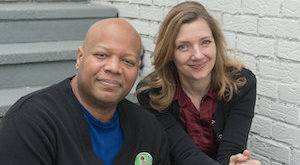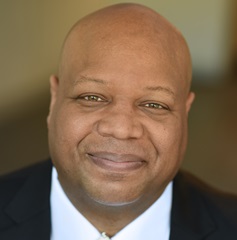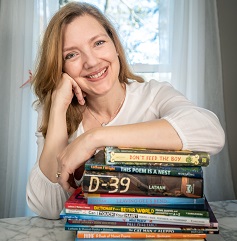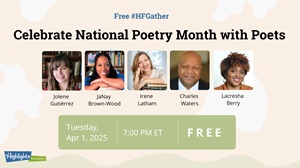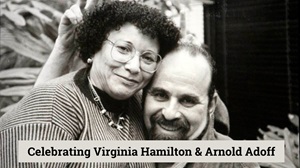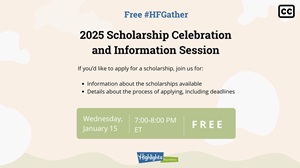What You’ll Find In this Podcast
Poets Charles Waters and Irene Latham were on campus for their workshop Poetry for Kids: A World of Publishing Possibilities. George Brown hosted them on our podcast to talk more about how their partnership came about, the market and craft of writing poetry for kids, and their writing practices.
Podcast Highlights
Irene, on her daily process:
It’s funny you say “work.” I’ve really worked to kind of eradicate that term in relation to my writing. What I really want to focus on, instead of discipline, is devotion, and writing from that place of joy and passion. Instead of the Drill Sergeant approach, which is: sit in the chair; the “butt in chair,” which we’ve all heard—I really want to come at my stories and ideas from the place of love.
Charles, on the importance of performing your poetry:
There was a study in USA TODAY many years ago…in a survey of what human beings are afraid of, more people said they’re afraid of public speaking than they are of death. So, to quote Jerry Seinfeld, they’d rather be in in the casket than delivering the eulogy. So how to…how can we overcome that? Because I get nervous sometimes, as well. I think it’s important for the students here to perform their poems. There’s nothing like somebody performing the poem as theatre, knowing it by heart or even close to. Sometimes it’s a lot better than just sitting and reading it; you’ll never look at poetry the same way after seeing somebody perform it. So that’s been my goal here is to get them on their feet in front of people, and being relaxed enough, and trust in their self and their process (in their words); to perform. And last year it was very emotional. A lot of people were…shaking, and they went up and they performed their poem. And the sky didn’t fall, their hair didn’t turn green. And they were so overwhelmed that they started crying afterwards and hugging each other. They got through it, and that’s such a win for them. And hopefully they can continue that in their poetic journey.
Full Transcript
George Brown: Welcome to the Highlights Foundation Gather podcast, where our mission is to positively impact children by amplifying the voices of storytellers who inform, educate, and inspire children to become their best selves. Let’s talk poetry for kids in today’s episode. It just so happens we have two great poets on campus at the Highlights Foundation Retreat Center this week. The workshop is called poetry for kids, a world of publishing possibilities. Welcome, Charles Waters and Irene Latham.
Charles Waters: Thank you for having us.
Irene Latham: Glad to be here.
George Brown: So in the next 20 minutes or so, I’m hoping we can just have an informal chat and get to know a little bit about you, about your writing life, and maybe tidbit or two of something from your experience teaching this workshop this week. So with that said, let’s jump right in first, like Irene, Charles. How do you know each other? How does this relationship come about?
Charles Waters: It came about through Irene and through an editor named Carol Hinz, who’s the associate publisher at Learner Publishing.
Irene Latham: We’ve worked on four books together that have been published. Couple more in the works and our books really kind of mirror the friendship that we’ve been able to form. We did not know each other well at all when we started collaborating, that has. Come with building books.
George Brown: And so somewhere along the line you said, let’s build a workshop.
Charles Waters: Somewhere along the line, so for for some background, at least on myself, I am a scholarship recipient. I believe it was in 2011. Your your father, Kent Brown, gave me a a scholarship to come to Highlights to take a poetry workshop with Rebecca Kai Dotlich. And what happened was I came here. I grew up outside of Philadelphia. I’m kind of a I’m a suburb city boy. I’m around all those woods and I was. I was a bit out of sorts and then after, not even a day, I felt really at home and embraced by. The community here on campus and. It means a lot to me that I’ve come back over the years as a student, and now that I’m a faculty member, and since Irene and I started working together in 2015, I I told her multiple times a year about the greatness of the highlights foundation and how. Wonderful it is when the what a great community it is. And how much? It would mean to me personally if we went there and talked together, it would be my way of giving back and would be a way to introduce Irene to the foundation. So that’s that’s how it came to be with our workshops.
Irene Latham: So I have been hearing about highlights for so many years, not just from Charles but from others who have attended. And I live in Alabama, and I’m introverted, and I love to stay at home with my family, so we just never had worked out previously. And but I also love to teach. I think a big part of my mission is serving other younger writers, so it was just a great fit for us to come together.
George Brown: Well, I’m sure glad you did. I know last year, 2022, I think was the first time you came here to teach on campus. And so you’ve come back this year. So then you had a couple of of I was just looking at the agenda you had you started yesterday with the workshop called finding your voice. And then there was poetry performance this morning. And revise like a master gardener that’s tomorrow. I can’t wait to my wife is a master gardener, so I can’t wait to see how you kind of pull all that piece together. And then we had guest presentations, both Carole Boston Weatherford and Carol Hinz. So tell me maybe just a little snippet. What did she talk about, or how did she? Fit in well.
Charles Waters: We get an e-mail from Allison that Carole Boston Weatherford was on campus, and Allison said if you’d like. Ask her, would she like to be part of your retreat? And Irene and I think said capital letters. Yes! with a Lot of exclamation.
George Brown: That’s a pretty good. Hey, this person.
Charles Waters: And we’ve been very fortunate that Carol Hinz was in person last year, and you usually you don’t have. Editors in person, maybe for a day or so are they zoom? Carol was there for four days and three nights, helping the attendees along with us. So Carole Boston Weatherford talked about her career and and she really demystified the writing process and the struggle she went through to become an author of over 70 books and winning so many awards and so lauded in children’s literature, and how that path happened for her. And I know that it helped the attendees and it helped us very much because Irene and I are constant learners.
Irene Latham: I think one of the takeaways from me listening to Carole, she’s so inventive as a writer and she takes risks. And I think beginners tend to get stuck in, you know, some expected language expected format and so great to hear her talk about her. Journey and you could just see the risk taking increasing as she grew as a writer. And so it was great for us to all hear that. One beginners, we all start the same. And two, these struggles continue. But you know, it builds on, you know, your words build on your words and your work builds on your work and new and fresh things can happen over time. So it’s so inspiring.
George Brown: So let’s just take a little trail down there on work. So Irene talked to me. What is your work?
Irene Latham:It’s funny you say “work.” I’ve really worked to kind of eradicate that term in relation to my writing. What I really want to focus on, instead of discipline, is devotion, and writing from that place of joy and passion. Instead of the Drill Sergeant approach, which is: sit in the chair; the “butt in chair,” which we’ve all heard—I really want to come at my stories and ideas from the place of love.
George Brown: So how does that manifest itself on like a daily or weekly basis?
Irene Latham: In a daily practice I do not neglect myself or my writing. And you know, I do write every day. It’s very important to me. I’m almost scared that if I didn’t do it, I would. Just stop, you know, so it’s a. Habit and it’s a practice, yes, yes.
George Brown: So you’re still putting your butt in the chair, and they’re still doing it regularly, but it’s your approach.
Irene Latham: Absolutely, 100%.
George Brown: You’re calling it more devotional approach to the craft and the passion.
Irene Latham: And to focus on play and experimentation instead of word count. So focusing on process and. You know, not the final product as a envisioning it to begin with kind of allowing that to unfold through the daily practice.
George Brown: And you’re a poet, but are you writing poems all day? Are you writing narrative? How do you mix and play?
Irene Latham: Yeah, I am. I’m lucky to. Have published some nonfiction novel. And they all interact. So I usually have a good idea going in that it should be poetry or it should be a longer work of fiction. But a lot of the play is poetry for me, and whatever I’m writing, it’s, you know, poetry is a playground. Man, I go after it in there. You know when I’m working.
George Brown: And Charles? What’s your writing practice look like?
Charles Waters: My writing practice is I don’t write every day like for example I haven’t written here, I’ve just caught up on. Reading things that I’ve needed to read for research for other books, my writing practice is I have to get more of the devotional, like Irene is. Sometimes it’s more scattershot. I haven’t been writing every. But I do. When I do write maybe four days a week, I put in a lot of hours, so I kind of make up, make up for it. I I feel but I need to to look at it more of a place of devotion. That’s a great term.
George Brown: But I think. Everybody has a little different process, right? And we have writers who come here who have full time jobs and they’re here. Because they haven’t had time to write. And I think what what’s interesting is to hear different people and their processes because there isn’t one right process, it’s it’s what works for you or what. Fits your schedule.
Irene Latham: And also that reading is part of the process. I mean if I’m if I’m reading, I count that.
Charles Waters: OK, so I’ve been working. On ideas and things.
Irene Latham: Know all of that’s part of it.
Charles Waters: Like that so. So that’s that’s that’s my process.
George Brown: And and Charles talk a little bit about the poetry performance. I I listened in a little bit this morning on the session and it seemed like the first thing you’re trying to do is just to get students comfortable with this idea of speaking and and giving their poetry.
Charles Waters: One of the things that. Everybody in the business are so multifaceted, so you have to find besides the runway or strengths you have. Irene is a master gardener, and so she can talk about that in in her writing, in her presentations. I’m a professional actor and I’ve performed hundreds of poems for many years. Most of them, or a lot of them from other people working for a company called Poetry Alive, where I performed 200 poems in three years and 37 states. And that’s how I got into poems. So I come at it from an acting point of view and a poetry performance point of view, and that’s been super helpful. So many people–There was a study in USA TODAY many years ago…in a survey of what human beings are afraid of, more people said they’re afraid of public speaking than they are of death. So, to quote Jerry Seinfeld, they’d rather be in in the casket than delivering the eulogy. So how to…how can we overcome that? Because I get nervous sometimes, as well. I think it’s important for the students here to perform their poems. There’s nothing like somebody performing the poem as theatre, knowing it by heart or even close to. Sometimes it’s a lot better than just sitting and reading it; you’ll never look at poetry the same way after seeing somebody perform it. So that’s been my goal here is to get them on their feet in front of people, and being relaxed enough, and trust in their self and their process (in their words); to perform. And last year it was very emotional. A lot of people were…shaking, and they went up and they performed their poem. And the sky didn’t fall, their hair didn’t turn green. And they were so overwhelmed that they started crying afterwards and hugging each other. They got through it, and that’s such a win for them. And hopefully they can continue that in their poetic journey.
George Brown: So back up and just explain that a little bit. You gave a lecture this morning on on kind of prepping for performance. Yes, but tonight.
Charles Waters: So what happens? What what will happen? Hopefully Irene and I teach here at least once a year, and every time there’ll be a poetry performance. So what happens is. After going through the workshop during the day. In the evening they perform in the horse barn. We get the string lights, we have desserts and they perform their poems. I call it the poetry Jamboree. And that’s just it. Not only is it great for them to speak in front of people, Irene and I are big on the students bonding. Because a lot of them are coming here and they’ve they’ve never been to Highlights before, they’re nervous, they’re around strangers, they’re an environment that’s not their own. And so the the quicker we get them in a nice non judgmental space where everybody supports each other, the. Better it is. For all of us. And I I think performing those poems helped that.
Irene Latham: I want to say something about this because I’ve taught in a lot of places. And when when Charles and I started plotting this workshop and he suggested this workshop acting and performing the poetry, I just knew it would be transformative. And also so need it because as an AO. Or nobody tells you going in that you’re going to be doing a lot of performing in school visits, presenting to groups and these skills are not something many of us are born with. And watching these students, and I’ve learned so much from the sessions, too, about how to perform with confidence and challenging yourself. That way, these are necessary skills for writers, and they aren’t being taught in other places, so I think it’s such a well-rounded kind of weekend retreat for these poets to be able to have that aspect as well.
George Brown: And I think too, it adds that special magic right. The fact that we’re going down into the horse barn and we’re making the ambiance. And so they’re in a safe space because they’ve gotten to know each other over the past couple of days. We’re all being vulnerable, sharing our poetry and figuring out how to support each other. To confront that fear of public speaking.
Irene Latham: Very safe space, very warm. And like you said, very bond in the group we had last time. They’re still in touch on a monthly basis and that that’s what we want that community building and us supporting each other and.
George Brown: And so what’s happening in the 1:00 to 1:00 conversations is are they? Did they bring a a packet of poems that you’re going over with?
Irene Latham: So they have, they have submitted their packet of poems. Charles and I have have had a chance to respond to the poetry beforehand. And then we get together and talk with them about what we see in their work and how they might improve it, make it more marketable. And and offer encouragement and specific feedback to grow as writers.
George Brown: I need to know. Irene, tell me what I revised. Like a master gardener. Like just do you have like a. The top bullet point of what that’s going to.
Irene Latham: Be like yes, I think revision is under taught and it’s my. Favorite thing to? Teach because that is where the marketability happens. You know, you take that raw idea, you put that seed that’s planted that seedling that has come out of the ground. How do you shape it? How do you? Picture it to make it that beautiful flower garden and there are very specific steps to nurturing that work. And and I I tried to provide specifics. They work on the poem in the session as we go, and then they have a whole arsenal, a whole toolbox, a whole tool bag. To take out to their own garden when they go home to work on their own poems.
George Brown: I always I’ve gotten the impression that revision is the while the most important, sometimes the most dreaded piece of the whole process.
Irene Latham: He wants to do it takes so much effort.
George Brown: All right, so let’s switch gears for a minute here and think about what are you working on now. Is there anything you’ve got in the in the hopper that you’re excited about book coming?
Charles Waters: Book coming out in in September on September 5th called Mascot, written with Traci Sorell. The award-winning writer. We are grateful. Traci and I met at Highlights at the novel in verse intensive with Kathy Erickson, Anna Fulton on faculty. And we kept in touch and. We’re collaborating on a book about a eighth grade. Middle school in a fictional town. These honor students, with the help of their teacher, protest their mascot, which is called the Braves. So this was the big pandemic project. It’s about three 3 1/2 years in. The making wow. And so a lot of research went into it. And that comes out and then I’m working on other things now. That’s one of the. A lot of. Reading on something that I’m working on now that hasn’t been sent to anyone yet. And Irene and I have two anthologies. We become anthologists, too, and they come out 2024 and 2025. From learner and from camp. Quick and so we’re we’re always on the hunt for what we’re going to do together next. It’s going to have to be one of those things that’s organic. We’ve learned in writing you cannot force things. Same thing with the creative process. So that’s what. That’s what I have.
George Brown: And so Traci Sorell has done a lot of work on the Native Creative Scholarship and the Native Creatives cabin. And she mentioned, and we did a little video clip with her. And she mentioned that book project that the two of you worked on in there.
George Brown: She just recently she sent us some furniture for the porch of that cabin, and she said keep an eye out for.
Charles Waters: The first timers I I took them on a tour of campus, so I showed them the the, the native creatives cabin I love with it. Tracy, I love the art work as.
George Brown: As well, yeah, she’s done a great job. Buying and finding the artwork, working with publishers to get books sent to us. So it’s a it’s a nice ambience in there. So, Irene, tell us what you’re working on, but also just tell me a little bit about your project with Dahlia. Since Dahlia is such a friend.
Irene Latham: Yes, Dahlia is such a friend. She and I collaborate on a book that is set in the Egyptian market. Dog is Egyptian, and it’s called a “Good Morning For Giddo.” And I have some international background from my childhood and. It’s a celebration of the arts that are unique to Egypt and daughter and her grandfather going through the marketplace, so very joyful book and if you know Dahlia, it would have to be joyful. I’m excited about that.
George Brown: And do you know when that’s planned for?
Irene Latham: Yeah, there’s an illustrator. I believe it comes out in 26.
George Brown: So we’ll be waiting.
Irene Latham: Yes, we’ll be waiting.
George Brown: And is there anything you’re working on? Right now that you think of.
Irene Latham: Yeah, I have. I have several that are releasing over the next several years as a couple of poetry collections book that. Turns out later this year, in August, called the “Museum on the Moon.” Lots of moon talk these days with the Artemis mission, and these are all the things that humans have left on the. Moon and then several others in 25 and 26. So my calendar is full.
George Brown: And I hope there’s still room in there for writing like these fun little side gigs. The stimulate your creativity, the devotional. Part of it. Well, thank you. Charles Waters, Irene Latham for joining us in studio four at the Highlights Foundation Retreat Center. Being a part of our gather podcast, I look forward to listening to this and sharing this with our entire highlights foundation community.
Charles Waters: Thank you, George, everybody. Come down and visit us here.
Irene Latham: There you go. Love being a part of this community, thank you.

